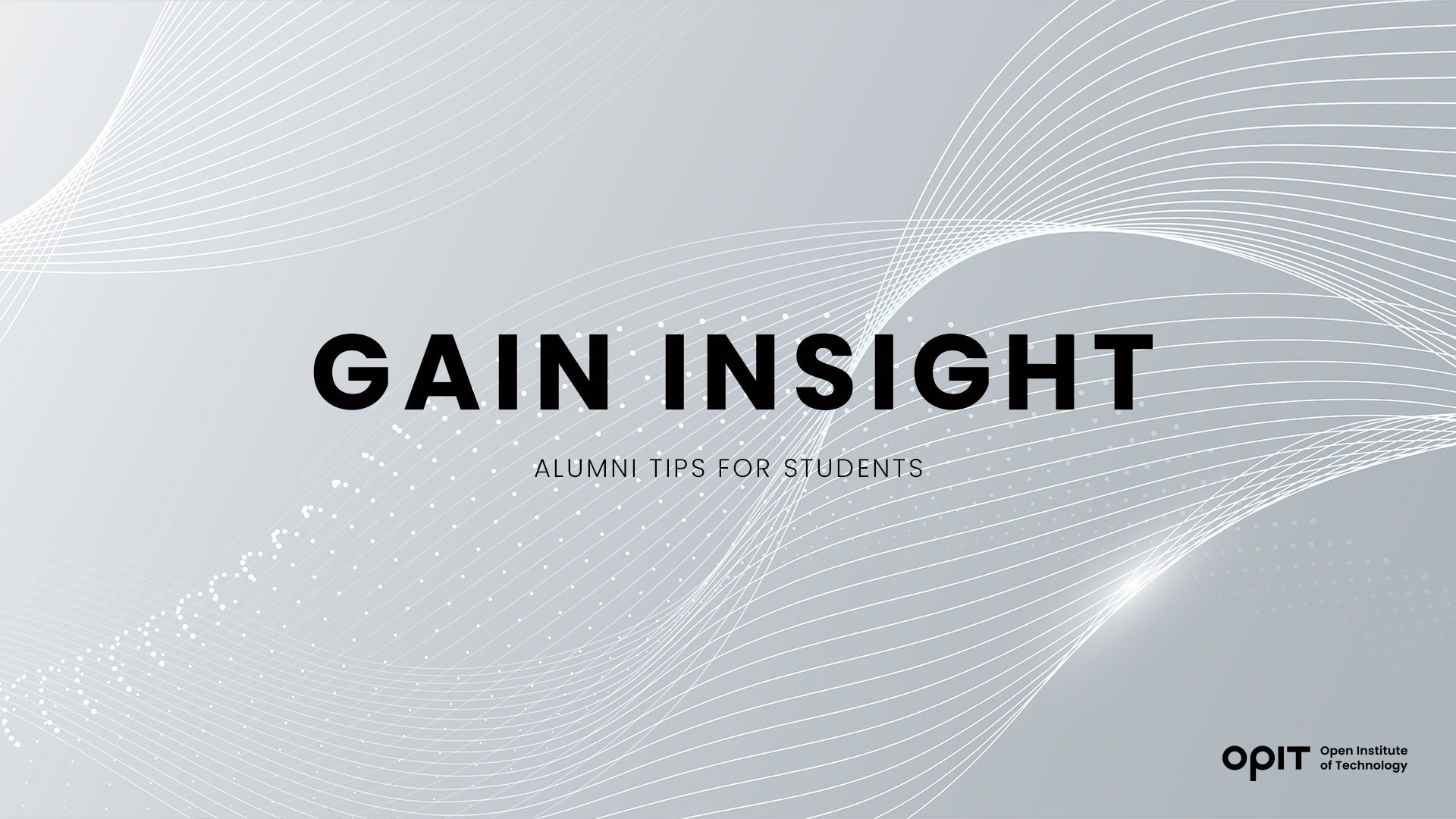

For most people, graduating is one of the happiest times of their lives. It means no more exams, no more deadlines, and no more all-nighters. But this feeling of joy and accomplishment can be quickly overshadowed by a fear of an uncertain future. Throw job market pressure and societal expectations into the mix, and the post-graduation joy quickly turns into post-graduation blues.
But there’s no need for this. Just like your educational institution of choice can get you ready for a career in your desired field, you can prepare yourself for the post-graduation journey. The Open Institute of Technology (OPIT) is here to help in both regards.
This article will guide you through your post-graduation journey, allowing you to relax once your graduation comes and you enter the competitive job market. To give you only the most useful advice, we’ve enlisted the help of one of our alums, Francesca Fancoli. She will chime in with her personal experience pre-, during, and post-OPIT. Let’s begin!
1. Follow Your Heart
It’s perfectly understandable if the words “Follow your heart” sound like nothing more than a cliché to you, especially in the cutthroat business world. But the truth is that genuine passion and intuition can be powerful guides.
Take Francesca as an example. Though she previously focused on climate-related issues and sustainability, she became intrigued by the use of artificial intelligence (AI) in the corporate world. That’s what brought her to OPIT and our Master in Applied Data Science and AI program.
As long as you continuously pursue a career that challenges and motivates you, you’ll likely find both fulfillment and success. This way, you’ll think of studying as not a mundane task but an adventure, just like Francesca does.
2. Network, Network, Network
Don’t let anyone convince you that “networking” is nothing more than a buzzword. Networking is still very much a valuable and effective way to build meaningful connections, gain insights, and open doors to new opportunities in your professional journey. The only thing that has changed is where networking takes place.
Sure, you can still attend formal networking events and career fairs in person, as this will allow you to build confidence and sharpen your interpersonal skills. But nowadays, you can also leverage the power of virtual networking, connecting with professionals globally through online platforms like LinkedIn.
Study online at OPIT, and you also get the chance to interact with classmates and alums from all over the world. For instance, Francesca comes from Italy, but OPIT students and alums can be found in virtually every corner of the world.
Genuinely getting to know your fellow students, professors, and professionals in your desired field can lead to all sorts of unexpected opportunities, as many job openings don’t even get posted online. Instead, they circulate within enclosed professional networks through word of mouth.
3. Don’t Wait for the Right Opportunity – Create It
This tip ties into the importance of networking. Suppose there’s a person you want to meet or a job you really want. If that’s the case, don’t just sit back and hope for an opportunity to achieve these goals comes your way. Instead, make your own opportunity.
Initiating contact and expressing genuine interest paints you as an assertive, proactive, and driven individual. And these qualities are precisely what many employers and influential professionals value. Plus, thanks to LinkedIn, you can demonstrate all these qualities from the comfort of your own home.
4. Create a Standout CV
Once the time comes to send out your CV (curriculum vitae) to your potential employer(s), you’ll want to ensure the CV in question truly stands out. After all, you only get one chance to make a first impression.
Of course, this doesn’t mean you should resort to flashy gimmicks whose only value is their shock factor. It means presenting a visually appealing, well-organized, and impactful document that will instantly set you apart from other candidates.
Though there are many factors in creating a standout CV, one is arguably the most important – customize your CV for the job you want. Nothing screams mediocrity more than submitting a generic CV to every job application.
Let’s say you study computer science and AI like Francesca and want to apply for a job in the field. In this case, your CV should showcase specific hands-on projects you’ve worked on during your studies and the technical skills you’ve mastered. You can even include some industry insight to demonstrate your understanding of the current trends and challenges.
For instance, one of the reasons Francesca chose her field of study at OPIT is that she believes that automation can help with “foreseeing risks” and “applying better compliance.”
5. Don’t Stress About the Interview
Obviously, this is easier said than done. It’s perfectly natural to be nervous before a big interview, especially if it’s your first post-graduation. But as long as you remain confident and express genuine interest in the position (and the company), you’ll likely make an excellent impression.
If you’re like Francesca, use the interview to showcase your passion for AI and computer science in general. Talk about your extracurricular activities in the field and all the fun projects you got to work on during your studies.
Of course, this doesn’t mean you should forget about the “traditional” interview question. Remember that most interviews are a lengthy process, so prepare yourself for the common questions that might come your way during it.
6. Continuously Educate Yourself
Newsflash – learning doesn’t stop once you graduate. Or at least, it shouldn’t. It’s crucial that you continuously strive to learn new skills, adapt to new technologies, and pursue relevant certifications.
That’s precisely what Francesca did when enrolling in OPIT. She sees her time here as “upskilling,” which will help her conquer the corporate job market.
Even if you land your dream job, keep learning and educating yourself. This will allow you to advance quickly and achieve long-term success in your desired field. And remember not to be too hard on yourself if there’s something you don’t know in your new job, as no one expects you to know everything from the get-go.
7. Don’t Fear a Career Break
A career break is nothing to fear and stress about. In fact, it can be a valuable opportunity for personal and professional growth. Take Francesca as an example, as she used her career breaks wisely – one to start a family and the other to study at OPIT.
8. Embrace Volunteering
Let’s say you can’t find a job for a while. Or, you want to use your career break wisely, like Francesca. Whatever the case, consider volunteering.
Volunteering can help you add relevant job experience to your CV and set you up for a successful career. Best of all? If you attend an online institution like OPIT, you might even have time to volunteer during your studies, making the transition from education to employment substantially smoother.
9. Step Out of Your Comfort Zone
It doesn’t matter if you’re currently studying, just graduated, or already in the job market. One thing remains the same – growth happens when you step beyond the familiar.
During studying, challenge yourself to explore different subjects, engage in extracurricular activities, and seek to understand the study materials beyond surface-level comprehension. For instance, during Francesca’s studies, her goal was to “understand the uses of AI in a corporate job and specifically what AI can do for compliance and risk management.”
After graduating and joining the job market, continue seeking opportunities to apply your knowledge in real-world scenarios. Don’t just stick to what you’ve learned or experienced in school. Even if these new experiences inspire you to change your career path, do it! This turned out great for Francesca, and it will surely be the same for you as long as you remain adaptable and embrace challenges with open arms.
Thanks to the digital age, even moving to another country mid-study is feasible, as you can “take” your studies with you. Just ask the lovely Francesca who moved from Italy to France.
10. Be Patient
Once you graduate, not everything will go your way. You might take a while to land your dream job or advance in your career. You might even start a job only to realize it’s not for you after all. And that’s more than OK. Remember that the best things are worth waiting for, and be easy on yourself while waiting for them.
Of course, if you’ve read all the tips outlined in this article, you won’t be waiting idly. You’ll use this time to better yourself, improve your skills, meet new people, and explore alternative paths. Combine these actions with your formal knowledge, and it’s only a matter of time before you reach the top. But more importantly – you’ll also enjoy your journey up there.
Put Your Trust in OPIT
At OPIT, we have one goal – to help you achieve your dream career. This involves empowering you to excel in your chosen field during and after graduation. If you have any questions about our study programs, contact us directly. We’ll be happy to share more tips from our alumni who have successfully navigated their career paths, just like Francesca.
Related posts

Source:
- EFMD Global, Published on July 12th, 2024.
By Stephanie Mullins
Many people love to read the stories of successful business school graduates to see what they’ve achieved using the lessons, insights and connections from the programmes they’ve studied. We speak to one alumnus, Riccardo Ocleppo, who studied at top business schools including London Business School (LBS) and INSEAD, about the education institution called OPIT which he created after business school.
Please introduce yourself and your career to date.
I am the founder of OPIT — Open Institute of Technology, a fully accredited Higher Education Institution (HEI) under the European Qualification Framework (EQF) by the MFHEA Authority. OPIT also partners with WES (World Education Services), a trusted non-profit providing verified education credential assessments (ECA) in the US and Canada for foreign degrees and certificates.
Prior to founding OPIT, I established Docsity, a global community boasting 15 million registered university students worldwide and partnerships with over 250 Universities and Business Schools. My academic background includes an MSc in Electronics from Politecnico di Torino and an MSc in Management from London Business School.
Why did you decide to create OPIT Open Institute of Technology?
Higher education has a profound impact on people’s futures. Through quality higher education, people can aspire to a better and more fulfilling future.
The mission behind OPIT is to democratise access to high-quality higher education in the fields that will be in high demand in the coming decades: Computer Science, Artificial Intelligence, Data Science, Cybersecurity, and Digital Innovation.
Since launching my first company in the education field, I’ve engaged with countless students, partnered with hundreds of universities, and collaborated with professors and companies. Through these interactions, I’ve observed a gap between traditional university curricula and the skills demanded by today’s job market, particularly in Computer Science and Technology.
I founded OPIT to bridge this gap by modernising education, making it affordable, and enhancing the digital learning experience. By collaborating with international professors and forging solid relationships with global companies, we are creating a dynamic online community and developing high-quality digital learning content. This approach ensures our students benefit from a flexible, cutting-edge, and stress-free learning environment.
Why do you think an education in tech is relevant in today’s business landscape?

As depicted by the World Economic Forum’s “Future of Jobs 2023” report, the demand for skilled tech professionals remains (and will remain) robust across industries, driven by the critical role of advanced technologies in business success.
Today’s companies require individuals who can innovate and execute complex solutions. A degree in fields like computer science, cybersecurity, data science, digital business or AI equips graduates with essential skills to thrive in this dynamic industry.
According to the International Monetary Fund (IMF), the global tech talent shortage will exceed 85 million workers by 2030. The Korn Ferry Institute warns that this gap could result in hundreds of billions in lost revenue across the US, Europe, and Asia.
To address this challenge, OPIT aims to democratise access to technology education. Our competency-based and applied approach, coupled with a flexible online learning experience, empowers students to progress at their own pace, demonstrating their skills as they advance.
Read the full article below:

Source:
- The European, Summer 2024 Edition, Page 24
With careful planning, ethical considerations, and ensuring human oversight is maintained, AI can have huge market research benefits, says Lorenzo Livi of the Open Institute of Technology.
By Lorenzo Livi
To market well, you need to get something interesting in front of those who are interested. That takes a lot of thinking, a lot of work, and a whole bunch of research. But what if the bulk of that thinking, work and research could be done for you? What would that mean for marketing as an industry, and market research specifically?
With the recent explosion of AI onto the world stage, big changes are coming in the marketing industry. But will AI be able to do market research as successfully? Simply, the answer is yes. A big, fat, resounding yes. In fact, AI has the potential to revolutionise market research.
Ensuring that people have a clear understanding of what exactly AI is is crucial, given its seismic effect on our world. Common questions that even occur amongst people at the forefront of marketing, such as, “Who invented AI?” or, “Where is the main AI system located?” highlight a widespread misunderstanding about the nature of AI.
As for the notion of a central “main thing” running AI, it’s essential to clarify that AI systems exist in various forms and locations. AI algorithms and models can run on individual computers, servers, or even specialized hardware designed for AI processing, commonly referred to as AI chips. These systems can be distributed across multiple locations, including data centres, cloud platforms, and edge devices. They can also be used anywhere, so long as you have a compatible device and an internet connection.
While the concept of AI may seem abstract or mysterious to some, it’s important to approach it with a clear understanding of its principles and applications. By promoting education and awareness about AI, we can dispel misconceptions and facilitate meaningful conversations about its role in society.
Read the full article below:
- The European, Pages 24 to 26.
Have questions?
Visit our FAQ page or get in touch with us!
Write us at +39 335 576 0263
Get in touch at hello@opit.com
Talk to one of our Study Advisors
We are international
We can speak in:


